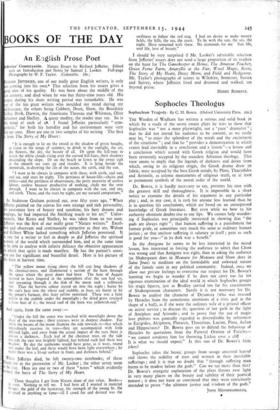Sophocles Theologus
Sophoclean Tragedy. By C. M. Bowra. (Oxford University Press. 2os.)
THE Warden of Wadham has written a serious and solid book in which by a study of the seven extant plays he tries to show that Sophocles was " not a mere playwright, not a ' pure ' dramatist " ; that he did not intend his audience to be content, as we easily may be, " to enjoy the splendour of the words and the excitement of the situations " ; and that he " provides a demonstration in which events lead inevitably to a conclusion and a lesson "—a lesson and a conclusion which accord with Greek religion and would have been reverently accepted by the soundest Athenian theology. This view seems to imply that the legends of darkness and doom from which, owing to its religious origin, the Greek drama drew its fabric, were accepted by the best Greek minds, by Plato, Thucydides and Aristotle, as solemn monuments of religious truth, or at least as permanent symbols of the moral order of the world.
Dr. Bowra, it is hardly necessary to say, presents his case with the greatest skill and thoroughness. It is impossible in a short notice to examine the details of his argument in any particular play ; and, in any case, it is rash for anyone less learned than he is to question his conclusions, which are based on an unsurpassed knowledge of Greek literature. But even while we bow to his authority obstinate doubts rise to our lips. We cannot help wonder- ing if Sophocles was principally interested in showing that " the gods are always right" ; that human suffering is a punishment for human pride, or sometimes very much the same as ordinary human justice ; or that anyhow suffering is salutary in itself ; pain as such is good for you—" in its dark way a benefit."
In the Antigone he seems to be less interested in the moral lesson, less interested in forcing the audience to admit that Cleon was wrong and that Antigone was right, than in asking the audience (as Shakespeare does in Measure for Measure and Shaw does in Saint Pan) to meditate on the formidable and awkward nature of the female saint in any political community. Indeed, once we allow our private feelings to overcome our respect for Dr. Bowra's learning we begin to wonder if he does not carry too far his rigorous examination of the ideal world in which Sophocles groups his tragic figures, just as Bradley carried too far his examination of Shakespearean characters. Surely it is not necessary for Dr. Bowra to analyse the character of Deianetra (who was rescued by Heracles from the unwelcome attentions of a rivet god in the shape of a bull), as if she were the ordinary wife of a general officer
on active service ; to discuss the question of her guilt in the light of Antiphon and Aristotle ; and to prove that the use of magic love philtres was generally regarded as discreditable by references
to Euripides, Alciphron, 'Plutarch, Theocritus, Lucian, Plato, Aelian and Hippocrates? Dr. Bowra goes on to defend the behaviour of
Heracles by quotations from the Funeral Oration of Pericles- " we cannot condemn him for throwing Lichas over a cliff . . It is what we should expect." Is this one of Dr. Bowra's little jokes?
Sophocles takes the heroic groups from savage ancestral legend and shows the nobility of men and women in their inevitable sufferings ; and it is true no doubt that " through suffering man learns to be modest before the gods." Can we say more than this? Dr. Bowra's energetic explanation of the plays throws new light in very many places on the beauty and subtlety of their poetical texture ; it does not leave us convinced that they were consciously intended to prove " the ultimate justice and wisdom of the gods."
JOHN MAVROGORDATO. •






















 Previous page
Previous page